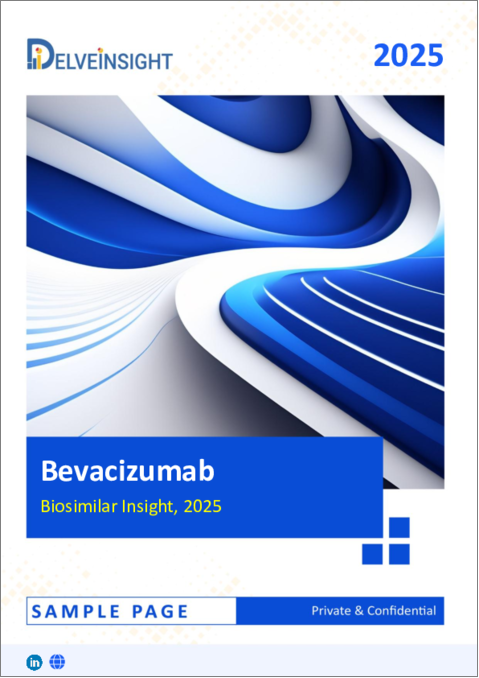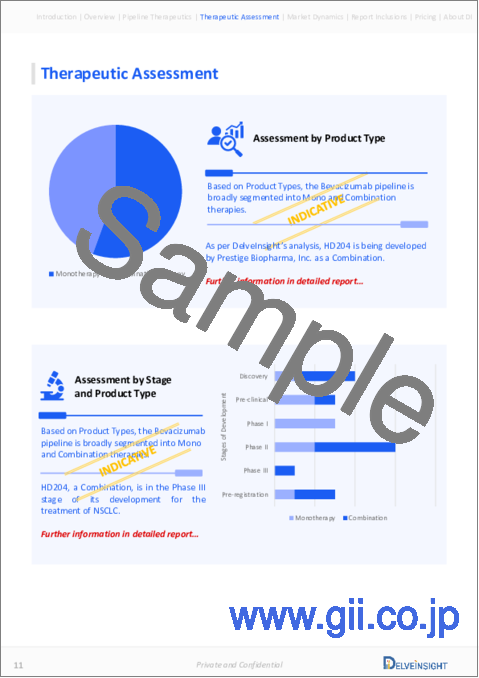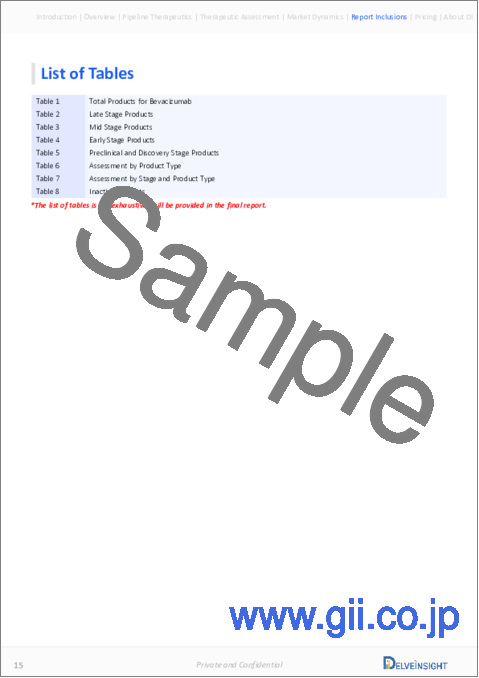|
|
市場調査レポート
商品コード
1727069
ベバシズマブ- バイオシミラーの洞察(2025年)Bevacizumab - Biosimilar Insight, 2025 |
||||||
カスタマイズ可能
適宜更新あり
|
|||||||
| ベバシズマブ- バイオシミラーの洞察(2025年) |
|
出版日: 2025年04月01日
発行: DelveInsight
ページ情報: 英文 80 Pages
納期: 2~10営業日
|
全表示
- 概要
- 図表
- 目次
当レポート「ベバシズマブ- バイオシミラーの洞察(2025年)」は、Bevacizumabバイオシミラーを取り巻く25社以上の企業、30以上の上市済み医薬品とパイプライン医薬品に関する包括的な洞察を提供しています。当レポートでは、臨床および非臨床段階の製品を含む、市販薬およびパイプライン医薬品のプロファイルをカバーしています。また、製品タイプ、ステージ、投与経路、分子タイプ別の治療薬評価もカバーしています。さらに、同分野における活動休止中のパイプライン製品にもスポットを当てています。
対象地域
- 世界を対象とする
ベバシズマブの理解
ベバシズマブの概要
アバスチンの商品名で販売されているベバシズマブは、多くの種類のがんや特定の眼疾患の治療に使用される薬剤です。血管内皮増殖因子(VEGF)ががん細胞の生存と増殖に重要であることを示す多くの証拠があります。VEGFは血管新生、リンパ管新生、腫瘍増殖に重要な役割を果たしており、これらはすべて抗がん剤の治療標的として魅力的な要因となっています。血管新生とは、既存の血管系から新しい血管が形成されることであり、腫瘍の発生と進行にとって重要なプロセスです。VEGFの最も強力なアイソフォームの一つであるVEGF-Aは、内皮細胞の増殖、遊走、新生血管の形成を促進することにより、このプロセスを刺激します。がんにおいては、VEGFの過剰発現は、腫瘍の脈管形成の亢進、腫瘍の攻撃的な挙動、および予後不良に関連しています。
2004年、ベバシズマブ(アバスチン)は特定のタイプのがんに対してFDAの承認を得て、市場に導入された最初の血管新生阻害剤となっています。この承認は、従来の細胞毒性化学療法から標的生物学的療法へと移行する、腫瘍学のパラダイムシフトを示しました。ベバシズマブはヒト化モノクローナルIgG1抗体で、VEGF-Aに特異的に結合して中和し、内皮細胞表面のVEGF受容体(VEGFR-1およびVEGFR-2)との相互作用を阻害します。これにより、血管新生と血管透過性に必要な下流のシグナル伝達が阻害され、腫瘍への血液供給が効果的に行われなくなり、腫瘍の増殖が阻害されます。
ベバシズマブは一般に、がんの種類、重症度、病期に応じて異なる化学療法レジメンとの併用に適応があります。例えば、転移性大腸がんでは5-フルオロウラシルベースの化学療法との併用、非扁平上皮非小細胞肺がん(NSCLC)ではカルボプラチンおよびパクリタキセルとの併用、転移性腎細胞がんではインターフェロンαとの併用が承認されています。また、膠芽腫、子宮頸がん、上皮性卵巣がん、卵管がん、原発性腹膜がんなどにも特定のプロトコールのもとで使用されています。ベバシズマブのがん領域における役割は依然として顕著であるが、網膜における異常な血管形成を阻害するその能力により、加齢黄斑変性(AMD)などの眼疾患に対する適応外使用においても有用性が示されています。この文脈では、その抗VEGF特性は黄斑浮腫を軽減し、視力を維持するのに役立ちます。しかし、ベバシズマブにリスクがないわけではありません。ベバシズマブの血管新生阻害作用は、高血圧、蛋白尿、創傷治癒障害、消化管穿孔、出血や血栓塞栓イベントのリスク増加などの副作用を引き起こす可能性があります。したがって、治療中は慎重な患者選択とモニタリングが重要です。
ベバシズマブ・バイオシミラー医薬品の各章
ベバシズマブレポートのこの章では、市販薬、第III相、第II相、第I相、前臨床など、さまざまな臨床開発段階にある薬剤の詳細な分析を掲載しています。また、臨床試験の詳細、表現力豊かな薬理作用、契約や共同研究、最新のニュースやプレスリリースの理解にも役立ちます。
市販されているベバシズマブ・バイオシミラー医薬品
- ムバシ:Amgen
Mvasiは血管内皮増殖因子阻害薬です。米国食品医薬品局は本日、Mvasi(bevacizumab-awwb)をアバスチン(bevacizumab)のバイオシミラーとして、複数の種類のがんの治療薬として承認しました。Mvasiは、がん治療薬として米国で承認された初めてのバイオシミラーです。
- ブライクタ:Zydus
Bryxtaは、チャイニーズハムスター卵巣細胞株で産生された組み換えヒト化モノクローナル抗体(1337アミノ酸を含む)です。VEGFは血管新生と血管新生を刺激するシグナルタンパク質です。ベバシズマブはVEGFに結合し、内皮細胞表面のVEGF受容体(VEGFR)であるFlt-1(VEGFR-1)およびKDR(VEGFR-2)との相互作用を阻害します。その結果、腫瘍血管系は退縮し、新たな腫瘍血管の成長は抑制されます。
新たなベバシズマブ・バイオシミラー薬
- ベバシズマブ・バイオシミラー(HD204):Prestige Biopharma
HD204はベバシズマブ(アバスチン(R))のバイオシミラーで、血管内皮増殖因子(VEGF)を標的とし阻害する遺伝子組換えヒト化モノクローナル抗体です。VEGFを阻害することで、HD204は血管新生(新しい血管が形成される過程)を阻害し、腫瘍の成長に必要な酸素と栄養を奪う。転移性大腸がん、進行性非小細胞肺がん、腎細胞がん、特定の上皮がん、子宮頸がんを含む様々ながんに対する他の治療法との併用で使用するために開発されています。現在、臨床第III相開発中(SAMSON-II)であり、HD204は第I相SAMSON-I試験においてAvastin(R)と同等の薬物動態、安全性、免疫原性を示しました。
- EG12021:EirGenix
EG12021はEirGenix社が開発したベバシズマブのバイオシミラーで、現在前臨床段階にあります。血管内皮増殖因子(VEGF)を標的として設計され、がんの増殖と転移における重要なプロセスである血管新生を阻害することを目的としています。このバイオシミラー医薬品は、アバスチン(R)に代わる費用対効果の高い代替品を提供し、様々な固形がんの治療をサポートすることを目指しています。
ベバシズマブの治療評価
当レポートのこのセグメントでは、以下のような当レポートの範囲を定義するパラメータに基づいて分別された、さまざまなベバシズマブのバイオシミラーに関する洞察を提供します:
ベバシズマブの主要企業
ベバシズマブの治療薬を開発している約25社以上の主要企業が存在します。
ベバシズマブバイオシミラーのフェーズ
DelveInsightのレポートでは、以下のような異なる臨床開発段階にある約30以上の製品をカバーしています。
- 上市段階製品
- 後期段階製品(BLA申請済みおよび第III相)
- 中期段階製品(第II相)
- 初期段階製品(第I相)、および以下の詳細を含みます。
- 前臨床および探索段階の候補化合物
- 製造中止・非活動候補品
投与経路
ベバシズマブのパイプラインレポートでは、投与経路別にパイプライン医薬品の治療評価を提供しています。製品は以下のような様々な投与経路に分類されています。
- 皮下投与
- 静脈内投与
分子タイプ
ベバシズマブ・バイオシミラー製品は、以下のような様々な分子タイプに分類されています。
- モノクローナル抗体
- ペプチド
- タンパク質
- 低分子
製品タイプ
医薬品は、単剤、配合剤、単剤/配合剤のような様々な製品タイプに分類されています。
ベバシズマブのパイプライン開発活動
当レポートは、上市、第III相、第II相、第I相、前臨床段階にあるさまざまな治療薬候補に関する洞察を提供します。また、ベバシズマブのバイオシミラー医薬品の主要開発企業についても分析しています。
パイプライン開発活動
当レポートでは、ベバシズマブバイオシミラー新薬の徹底的な治療評価とともに、共同研究、買収・合併、ライセンシングの詳細情報を網羅しています。
ベバシズマブバイオシミラーレポートのハイライト
企業や研究機関は、ベバシズマブの研究開発に影響を与えうる課題を評価し、機会を模索することに取り組んでいます。開発中の治療薬は、ベバシズマブを治療/改善する新規アプローチに焦点を当てています。
- 2025年4月、Biocon Biologicsは、米国食品医薬品局(FDA)が静注用ベバシズマブのバイオシミラーであるJobevne(bevacizumab-nwgd)を承認したと発表しました。JOBEVNEは、複数の異なるタイプのがんの治療に使用される遺伝子組換えヒト化モノクローナル抗体で、基準製品であるアバスチン(R)(ベバシズマブ)のバイオシミラーです。
- 2025年1月、Outlook Therapeuticsは、湿性加齢黄斑変性症(wet AMD)の治療薬としてベバシズマブの眼科用製剤が欧州連合(EU)および英国(UK)で初めて承認されたことを受け、2025年1月にハワイ州カウアイ島で開催されるHawaiian Eye and Retina 2025 MeetingでNORSE EIGHTのデータを発表しました。
ベバシズマブバイオシミラーのレポートインサイト
- ベバシズマブバイオシミラーのパイプライン分析
- ベバシズマブバイオシミラーの治療評価
- ベバシズマブバイオシミラーの売上評価
- ベバシズマブバイオシミラーのアンメットニーズ
- ベバシズマブ・バイオシミラー医薬品のインパクト
ベバシズマブバイオシミラーレポート評価
- 市販されているベバシズマブバイオシミラー製品のプロファイル
- ベバシズマブバイオシミラーパイプライン製品プロファイル
- ベバシズマブバイオシミラー治療アセスメント
- ベバシズマブバイオシミラーパイプライン評価
- ベバシズマブバイオシミラー販売アセスメント
- 非活性型ベバシズマブバイオシミラー医薬品アセスメント
- ベバシズマブバイオシミラーのアンメットニーズ
目次
第1章 重要な洞察
第2章 ベバシズマブバイオシミラー:概要
第3章 エグゼクティブサマリー
第4章 概要
第5章 バイオシミラーの規制見通し
- 北米
- 米国
- カナダ
- 欧州
- アジア太平洋
- 中国
- インド
- 日本
- 韓国
- オーストラリア
- その他の地域
- ブラジル
- メキシコ
- アルゼンチン
- サウジアラビア
第6章 ベバシズマブ(参照製品:アバスチン)
- 薬物プロファイル
- 製品概要
- 規制当局の承認と発売
- 適応症
- 作用機序
- 用法・用量
- 投与量と強度
- 用量変更
- 合成経路
- 薬理学
- 薬力学
- 薬物動態
- 副作用
- 製品スナップショット
- 開発のマイルストーン
第7章 研究開発
- 臨床試験情報
- 安全性と有効性
第8章 アバスチンバイオシミラー:新たな機会
第9章 ベバシズマブ:バイオシミラーの評価
- 製品タイプ別の評価
- 投与経路別評価
- 分子タイプ別評価
- 販売評価
- Prestige Biopharma
- Shanghai Henlius Biotech
- Sinocelltech
- EirGenix
- その他
第11章 ベバシズマブバイオシミラー:比較情勢:企業別
第12章 ベバシズマブバイオシミラー:競合情勢
- 概要
- 市場シェア分析
- 競合シナリオ
第13章 市場促進要因
第14章 市場抑制要因
第15章 SWOT分析
第16章 付録
第17章 参考文献
第18章 サービス内容
第19章 免責事項
第20章 調査会社について
List of Tables
- Table 1 Total Products for Bevacizumab
- Table 2 Late Stage Products
- Table 3 Mid Stage Products
- Table 4 Early Stage Products
- Table 5 Pre-clinical & Discovery Stage Products
- Table 6 Assessment by Product Type
- Table 7 Assessment by Stage and Product Type
- Table 8 Assessment by Route of Administration
- Table 9 Assessment by Stage and Route of Administration
- Table 10 Assessment by Molecule Type
- Table 11 Assessment by Stage and Molecule Type
- Table 12 Inactive Products
List of Figures
- Figure 1 Total Products for Bevacizumab
- Figure 2 Late Stage Products
- Figure 3 Mid Stage Products
- Figure 4 Early Stage Products
- Figure 5 Preclinical and Discovery Stage Products
- Figure 6 Assessment by Product Type
- Figure 7 Assessment by Stage and Product Type
- Figure 8 Assessment by Route of Administration
- Figure 9 Assessment by Stage and Route of Administration
- Figure 10 Assessment by Molecule Type
- Figure 11 Assessment by Stage and Molecule Type
- Figure 12 Inactive Products
DelveInsight's, "Bevacizumab - Biosimilar Insight, 2025," report provides comprehensive insights about 25+ companies and 30+ marketed and pipeline drugs in Bevacizumab Biosimilars landscape. It covers the marketed and pipeline drug profiles, including clinical and nonclinical stage products. It also covers the therapeutics assessment by product type, stage, route of administration, and molecule type. It further highlights the inactive pipeline products in this space.
Geography Covered:
- Global coverage
Bevacizumab Understanding
Bevacizumab Overview
Bevacizumab, sold under the brand name Avastin, is a medication used to treat a number of types of cancers and specific eye diseases. There is a great deal of evidence indicating that vascular endothelial growth factor (VEGF) is important for the survival and proliferation of cancer cells. VEGF plays an important role in angiogenesis, lymphangiogenesis, and tumor growth, which are all factors that contribute to its attractiveness as a therapeutic target for anti-cancer therapies. Angiogenesis, the formation of new blood vessels from pre-existing vasculature, is a critical process for tumor development and progression, as tumors require a blood supply to grow beyond a certain size and to metastasize. VEGF-A, one of the most potent isoforms of VEGF, stimulates this process by promoting endothelial cell proliferation, migration, and new vessel formation. In the context of cancer, overexpression of VEGF has been linked to increased tumor vascularization, aggressive tumor behavior, and poor prognosis.
In 2004, bevacizumab (Avastin) gained FDA approval for specific types of cancer and became the first antiangiogenic agent introduced to the market. Its approval marked a paradigm shift in oncology, moving beyond traditional cytotoxic chemotherapy to targeted biological therapies. Bevacizumab is a humanized monoclonal IgG1 antibody that specifically binds to and neutralizes VEGF-A, thereby inhibiting its interaction with VEGF receptors (VEGFR-1 and VEGFR-2) on the surface of endothelial cells. This prevents downstream signaling required for angiogenesis and vascular permeability, effectively starving the tumor of its blood supply and impeding its growth.
Bevacizumab is generally indicated for use in combination with different chemotherapy regimens which are specific to the type, severity, and stage of cancer. For example, it is approved for use in metastatic colorectal cancer in combination with 5-fluorouracil-based chemotherapy, in non-squamous non-small cell lung cancer (NSCLC) with carboplatin and paclitaxel, and in metastatic renal cell carcinoma with interferon-alpha. It is also used in glioblastoma, cervical cancer, and epithelial ovarian, fallopian tube, or primary peritoneal cancer under specific protocols. While its role in oncology remains prominent, bevacizumab has also shown benefit in off-label use for ocular conditions such as age-related macular degeneration (AMD) due to its ability to inhibit abnormal blood vessel formation in the retina. In this context, its anti-VEGF properties help reduce macular edema and preserve vision. However, bevacizumab is not without risks. Its inhibition of angiogenesis can lead to adverse effects including hypertension, proteinuria, impaired wound healing, gastrointestinal perforation, and increased risk of bleeding or thromboembolic events. Therefore, careful patient selection and monitoring are critical during treatment.
Bevacizumab Biosimilars Drugs Chapters
This segment of the Bevacizumab report encloses its detailed analysis of various drugs in different stages of clinical development, including marketed, phase III, II, I and preclinical. It also helps to understand clinical trial details, expressive pharmacological action, agreements and collaborations, and the latest news and press releases.
Marketed Bevacizumab Biosimilars Drugs
- Mvasi: Amgen
Mvasi is a vascular endothelial growth factor inhibitor. The U.S. Food and Drug Administration today approved Mvasi (bevacizumab-awwb) as a biosimilar to Avastin (bevacizumab) for the treatment of multiple types of cancer. Mvasi is the first biosimilar approved in the U.S. for the treatment of cancer.
- Bryxta: Zydus
Bryxta is a recombinant humanized monoclonal antibody (containing 1337 amino acids) produced in Chinese Hamster Ovary cell line. VEGF is a signal protein which stimulates vasculogenesis and angiogenesis. Bevacizumab binds to VEGF and inhibits its interactions with VEGF receptors (VEGFRs), Flt-1 (VEGFR-1) and KDR (VEGFR-2), on the surface of endothelial cells. This results in regression of tumour vasculature and inhibition of new tumour vessel growth.
Emerging Bevacizumab Biosimilars Drugs
- Bevacizumab biosimilar (HD204): Prestige Biopharma
HD204 is a biosimilar to bevacizumab (Avastin(R)), a recombinant humanized monoclonal antibody that targets and inhibits vascular endothelial growth factor (VEGF). By blocking VEGF, HD204 disrupts angiogenesis-the process of new blood vessel formation-thereby starving tumors of the oxygen and nutrients needed for growth. It is being developed for use in combination with other treatments for various cancers, including metastatic colorectal cancer, advanced non-small-cell lung cancer, renal cell carcinoma, certain epithelial cancers, and cervical cancer. Currently in Phase III clinical development (SAMSON-II), HD204 previously demonstrated comparable pharmacokinetics, safety, and immunogenicity to Avastin(R) in the Phase I SAMSON-I trial.
- EG12021: EirGenix
EG12021 is a bevacizumab biosimilar developed by EirGenix, currently in the preclinical stage. Designed to target vascular endothelial growth factor (VEGF), it aims to inhibit angiogenesis, a key process in cancer growth and metastasis. The biosimilar seeks to provide a cost-effective alternative to Avastin(R), supporting treatment across various solid tumors.
Bevacizumab Therapeutic Assessment
This segment of the report provides insights about the different Bevacizumab biosimilars segregated based on following parameters that define the scope of the report, such as:
Major Players in Bevacizumab
There are approx. 25+ key companies which are developing the therapies for Bevacizumab.
Bevacizumab Biosimilar Phases
DelveInsight's report covers around 30+ products under different phases of clinical development like
- Marketed stage products
- Late stage products (BLA Filed and Phase III)
- Mid-stage products (Phase II and
- Early-stage products (Phase I) along with the details of
- Pre-clinical and Discovery stage candidates
- Discontinued & Inactive candidates
Route of Administration
Bevacizumab pipeline report provides the therapeutic assessment of the pipeline drugs by the Route of Administration. Products have been categorized under various ROAs such as
- Subcutaneous
- Intravenous
Molecule Type
Bevacizumab Biosimilar Products have been categorized under various Molecule types such as
- Monoclonal antibodies
- Peptide
- Protein
- Small molecule
Product Type
Drugs have been categorized under various product types like Mono, Combination and Mono/Combination.
Bevacizumab Pipeline Development Activities
The report provides insights into different therapeutic candidates in marketed, phase III, II, I and preclinical stage. It also analyses Bevacizumab biosimilars drugs key players involved in developing key drugs.
Pipeline Development Activities
The report covers the detailed information of collaborations, acquisition and merger, licensing along with a thorough therapeutic assessment of emerging Bevacizumab biosimilar drugs.
Bevacizumab Biosimilar Report Highlights
The companies and academics are working to assess challenges and seek opportunities that could influence Bevacizumab R&D. The therapies under development are focused on novel approaches to treat/improve Bevacizumab.
- In April 2025, Biocon Biologics announced that the US Food and Drug Administration (US FDA) had approved Jobevne (bevacizumab-nwgd), a biosimilar Bevacizumab for intravenous use. JOBEVNE, a recombinant humanized monoclonal antibody used to treat several different types of cancer, is a biosimilar to the reference product Avastin(R) (bevacizumab).
- In January 2025, Outlook Therapeutics achieved regulatory approval in the European Union (EU) and the United Kingdom (UK) for the first authorized use of an ophthalmic formulation of bevacizumab for the treatment of wet age-related macular degeneration (wet AMD), announced the presentation of data from NORSE EIGHT at the Hawaiian Eye and Retina 2025 Meeting being held January 2025 in Kauai, HI.
Bevacizumab Biosimilars Report Insights
- Bevacizumab Biosimilar Pipeline Analysis
- Bevacizumab Biosimilar Therapeutic Assessment
- Bevacizumab Biosimilar Sales Assessment
- Bevacizumab Biosimilar Unmet Needs
- Impact of Bevacizumab Biosimilar Drugs
Bevacizumab Biosimilar Report Assessment
- Marketed Bevacizumab Biosimilar Product profiles
- Bevacizumab Biosimilar Pipeline Product Profiles
- Bevacizumab Biosimilar Therapeutic Assessment
- Bevacizumab Biosimilar Pipeline Assessment
- Bevacizumab Biosimilar Sales Assessment
- Inactive Bevacizumab Biosimilar drugs assessment
- Bevacizumab Biosimilar Unmet Needs
Key Questions:
Current Treatment Scenario and Emerging Therapies:
- How many companies are developing Bevacizumab Biosimilars?
- How many Bevacizumab biosimilars are developed by each company?
- How many emerging biosimilars are in mid-stage, and late-stage?
- What are the key collaborations (Industry-Industry, Industry-Academia), Mergers and acquisitions, licensing activities related to the Bevacizumab biosimilars therapeutics?
- What are the clinical studies going on for Bevacizumab biosimilars and their status?
- What are the key designations that have been granted to the emerging drugs?
Bevacizumab Biosimilar Companies
- Shanghai Henlius Biotech
- Aurobindo Pharma
- MiGenTra
- Innovent Bio
- Outlook Therapeutics
- Sinocelltech
- Samsung Bioepis
- Qilu Pharmaceutical
- Prestige Biopharma
- Pfizer
- Celltrion
Key Bevacizumab Biosimilar Products
- HLX 04
- Bevacizumab biosimilar
- Zevanzia
- BYVASDA
- ONS-5010
- SCT510
- Onbevzi
- Ankeda
- HD204
- ZIRABEV
- Vegzelma
Table of Contents
1. Key Insights
2. Bevacizumab Biosimilars: Snapshot
3. Executive Summary
4. Overview
- 4.1. The Basics of Biologics.
- 4.2. Biosimilars are not the Same as Generic Drugs
- 4.3. Economics of Biosimilars - the Promise of Lower Prices, but at What Cost?
- 4.4. What Patients Need to Know About Biosimilars
5. Regulatory Outlook For Biosimilars
- 5.1. North America
- 5.1.1. US
- 5.1.2. Canada
- 5.2. Europe
- 5.3. Asia Pacific
- 5.3.1. China
- 5.3.2. India
- 5.3.3. Japan
- 5.3.4. South Korea
- 5.3.5. Australia
- 5.4. Rest Of The World
- 5.4.1. Brazil
- 5.4.2. Mexico
- 5.4.3. Argentina
- 5.4.4. Saudi Arabia
6. Bevacizumab (Reference Product: Avastin)
- 6.1. Drug Profile
- 6.2. Product Overview
- 6.3. Regulatory Approvals and Launch
- 6.4. Indications
- 6.5. Mechanism of Action
- 6.6. Dosage and Administration
- 6.7. Dosage and Strengths
- 6.8. Dose Modification
- 6.9. Route of Synthesis
- 6.10. Pharmacology
- 6.11. Pharmacodynamics
- 6.12. Pharmacokinetics
- 6.13. Adverse Reactions
- 6.14. Product Snapshot
- 6.15. Development Milestones
7. Research and Development
- 7.1. Clinical Trials Information
- 7.2. Safety and Efficacy
8. Avastin Biosimilar: Emerging Opportunities
9. Bevacizumab: Biosimilars Assessment
- 9.1. Assessment by Product Type
- 9.2. Assessment by Route of Administration
- 9.3. Assessment by Molecule type
- 9.4. Sales Assessment
- 10.1.1. Prestige Biopharma
- 10.1.1.1. Bevacizumab biosimilar (HD204): Prestige Biopharma
- 10.1.1.1.1. Product Information
- 10.1.1.1.2. Research and Development
- 10.1.1.1.3. Other Development Activities
- 10.1.1.1.4. General Description Table
- 10.1.2. Shanghai Henlius Biotech
- 10.1.2.1. IBI-301: Innovent Biologics
- 10.1.2.1.1. Product Information
- 10.1.2.1.2. Research and Development
- 10.1.2.1.3. Other Development Activities
- 10.1.2.1.4. General Description Table
- 10.1.3. Sinocelltech
- 10.1.3.1. SCT510: Sinocelltech
- 10.1.3.1.1. Product Information
- 10.1.3.1.2. Research and Development
- 10.1.3.1.3. Other Development Activities
- 10.1.3.1.4. General Description Table
- 10.1.4. EirGenix
- 10.1.4.1. EG12021: EirGenix
- 10.1.4.1.1. Product Information
- 10.1.4.1.2. Research and Development
- 10.1.4.1.3. Other Development Activities
- 10.1.4.1.4. General Description Table
- 10.1.5. Company Name
- 10.1.5.1. Drug Name: Company Name
- 10.1.5.1.1. Product Information
- 10.1.5.1.2. Research and Development
- 10.1.5.1.3. Other Development Activities
- 10.1.5.1.4. General Description Table
- 10.1.1. Prestige Biopharma
11. Bevacizumab Biosimilars: Comparative Landscape: By Company
12. Bevacizumab Biosimilars: Competitive Landscape
- 12.1.1. Overview
- 12.1.2. Market Share Analysis
- 12.1.3. Competitive Scenario
- 12.1.3.1. Product Launches and approval
- 12.1.3.2. Partnerships, Collaborations and Agreements
- 12.1.3.3. Acquisitions
- 12.1.3.4. Expansions
- 12.1.3.5. Patent Expiration of Biologics
13. Market Drivers
14. Market Barriers
15. SWOT Analysis
16. Appendix
- 16.1. Research Methodology
- 16.1.1. Coverage
- 16.1.2. Secondary Research






